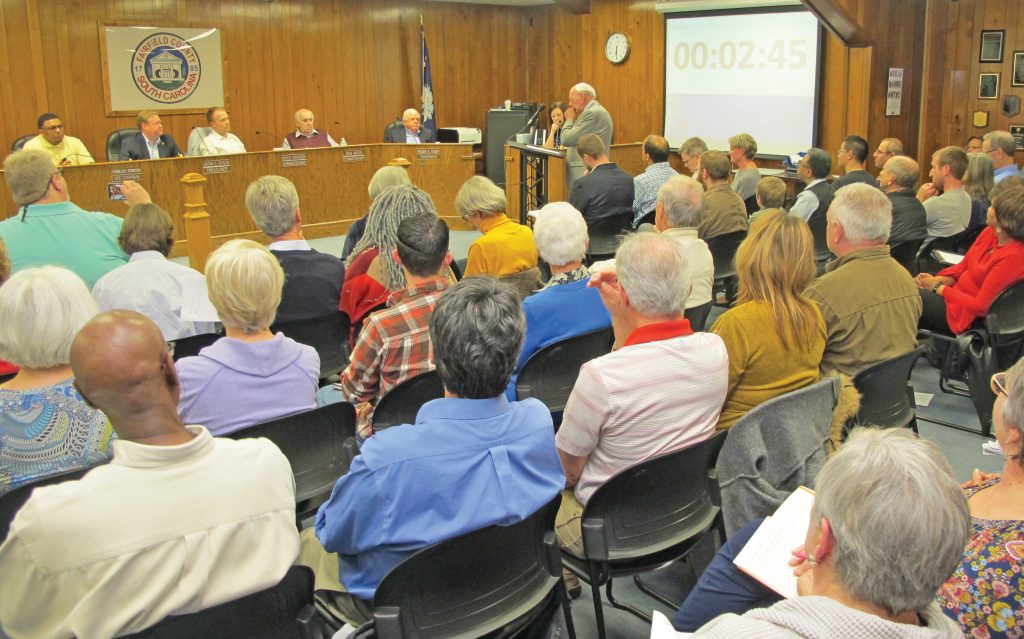
WINNSBORO – After spending more than a month battling Fairfield County’s proposal to build a wastewater treatment plant in the vicinity of Syrup Mill and Broom Mill Roads, Center Creek and Cedar Creek residents were invited to express their concerns to the Fairfield County Joint Water and Sewer Authority Commission Tuesday evening in Fairfield county council chambers.
While the public notice of the meeting stated that anyone who desired could speak to the issue, only six of the capacity crowd addressed council. The speakers mostly agreed that they want Fairfield County to grow and prosper. They were generally divided, however, in their focus based on where they live.
Center Creek residents generally protested the location of the county’s planned wastewater treatment plant in proximity to their homes, saying they would be plagued by the smell, noise and unsightliness of the plant. They said they didn’t trust the Department of Health and Environment Control (DHEC) to monitor and regulate the wastewater treatment process, and they want the county to find another location further from their homes.
Cedar Creek residents protested the county’s plan to discharge the treated effluent into Big Cedar Creek which runs past or near their homes and properties. They said they fear it will contaminate the creek, their water wells and their lands.
The meeting was opened by Commission Chairman Roger Gaddy, Mayor of Winnsboro, who turned the program over to Chris Clausen, the county’s community development director, who explained the county’s need for infrastructure to help stem the loss of population and bring economic development to the county.
“The Central Midlands Council of Governments’ (CMCOG) population projection two years ago was really alarming. The number it projected for the County by 2050 was only 26,925 people, only a 2,500 increase in population over the next 30 years,” Clausen said. “That is not sustainable for this county. So we need to look at how can we grow and develop this county.”
Clausen said the biggest impediment to growth is the lack of utility infrastructure in the county, particularly wastewater, thus the need to find a suitable site for a wastewater treatment plant to encourage and accommodate not only industrial growth but residential growth as well.
To his point, Clausen and the county’s Economic Development Director Ty Davenport presented data affirming the safety, reliability and “the highest level of treatment standards produced by the Membrane Bio-Reactor (MBR) wastewater treatment process” proposed at the Syrup Mill Road site. That data also included other information and charts explaining why the county cannot afford another $40 million to take the effluent to the Broad River, the ideal site from all perspectives in the room. Davenport said the County is still looking at five different sites, to include the Syrup Mill/Broom Mill Site.
Following executive session during the Monday night county council meeting, council voted to authorize County Administrator Jason Taylor to pursue negotiations for a site other than the Syrup Mill site.
At Tuesday night’s meeting, however, Center Creek and Cedar Creek residents, praised the county’s efforts to find other sites for both the treatment facility and the effluent discharge, but made it clear they were not backing down.
Some residents offered to help the county find the funding to take the effluent to the Broad.
“I do think this is a tremendous opportunity for the county to be set up for success in the future regarding residential, commercial and industrial growth. However, I’m adamantly opposed to the wastewater going into Cedar Creek, and I am committed to working with the county to seek additional funding to carry this to the Broad River,” Cedar Creek resident Lynn Beckham Robertson told the Commissioners. “There are other options.”




